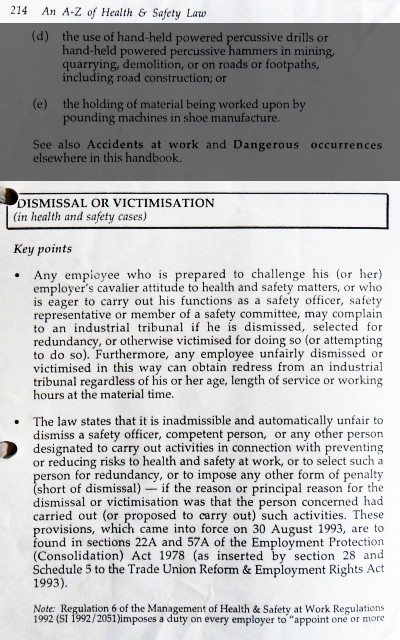|
Let the Devil Wear Black | James F Linden. The true story of the Courtaulds Cancer-Gas Scandal. |
Resources - Automatically fair or unfair
Circumstances when a dismissal is automatically fair and when it is automatically unfair.
Chapter 17
[about the ‘proof of evidence’] — “Yes, it seems that they didn’t remember that Bexley wasn’t actually at that meeting. Then they got someone who knew a bit about tribunal cases to edit it and throw in something that would guarantee them winning the case.”
“Hence the national security invention.”
“Yes,” Harry said thoughtfully. “You know, with you making such a noise about safety concerns, with one of the two near miss reports going missing and then concerns with safety inspections, it was looking as though they got rid of you because of safety. With you being a safety inspection co–ordinator, doing so would have made the dismissal automatically unfair.”
By the end of the first day of the tribunal case, with the computer and telephone evidence already demonstrated to be nothing more than a rather poorly manufactured smokescreen, it was pretty obvious to the tribunal themselves that the case was really about safety, with the dismissing officer’s testimony demonstrating later on in the case that he took an active role in the original dismissal, making sure that no useful evidence passed into the wrong hands thus reaching the required verdict — as predicted in the insider tip–off some weeks earlier.
With the fact that the tribunal was faced with a situation where the company’s own evidence demonstrated that a safety inspection co–ordinator, clearly with no tolerance for outstanding safety issues, had been sacked for performing his safety–related role, that meant that the dismissal could only be automatically unfair.
From the company’s point of view however, such a person who before, had been victimised with low pay and status, subsequently been sacked and then treated so badly by the company in the mean time, then re–instated in the same role as before, as a result of an unfair dismissal decision, would have had so many hatchets to bury that managers would have been falling faster than people could be promoted to replace them.
Clearly, many managers in the company, perhaps justifiably, would have worked out that losing the tribunal case would mean that they would lose their job or at least be severely reprimanded and punished in some way thus, losing the tribunal case was not an option.
However, their was light at the end of the tunnel, even if it was the sun shining out of someone’s arse. The company was a C.I.M.A.H. site and as such, was potentially a target — in much the same way that a lorry tire dump was. Therefore some bright spark who clearly knew a bit about the tribunal system — we know not whom — thought that if they could claim that my dismissal was the result of national security, then the dismissal would be automatically fair.
The problem with this new tack was that the first day of the tribunal hearing was open to the public and there was no mention of national security until: after the end of the first day, where it had already become clear that it was about safety; and, after Bexley’s death when they had the opportunity to write a new story.
They now had the means, motive and opportunity. However, doing something would require action on their part.
We then observed:
- The company’s solicitor letting it slip that they had been having secret communications with the industrial tribunal’s chairman, where it had presented the new idea of national security, clearly, from the way it was played in the tribunal hearing, in an attempt to influence the chairman’s decision as he acted in his judicial capacity;
- Snaith’s curious and comical testimony about national security being the reason for failing to supply evidence;
- Bexley’s posthumous claim that he witnessed me not denying writing the password capturing program even though he was never there; and, so on.
It was a pity for the company that the chairman told us all, immediately after he had heard the company’s new claims in the ‘proof of evidence’, that he thought it was completely irrelevant and that he would only make use of any of it if it became clear that it was relevant and he would then disclose it in its entirety.
Thus influencing the content of the case became an avenue that was closed to the company and they would have to use a different way of trying to win the case — something a bit more ‘Edge of Darkness.’
The chairman brought him up to date on the latest witness deaths in the case and then we were all ready to start.
Copyright © 1994-2023 James F Linden. All Rights Reserved.


